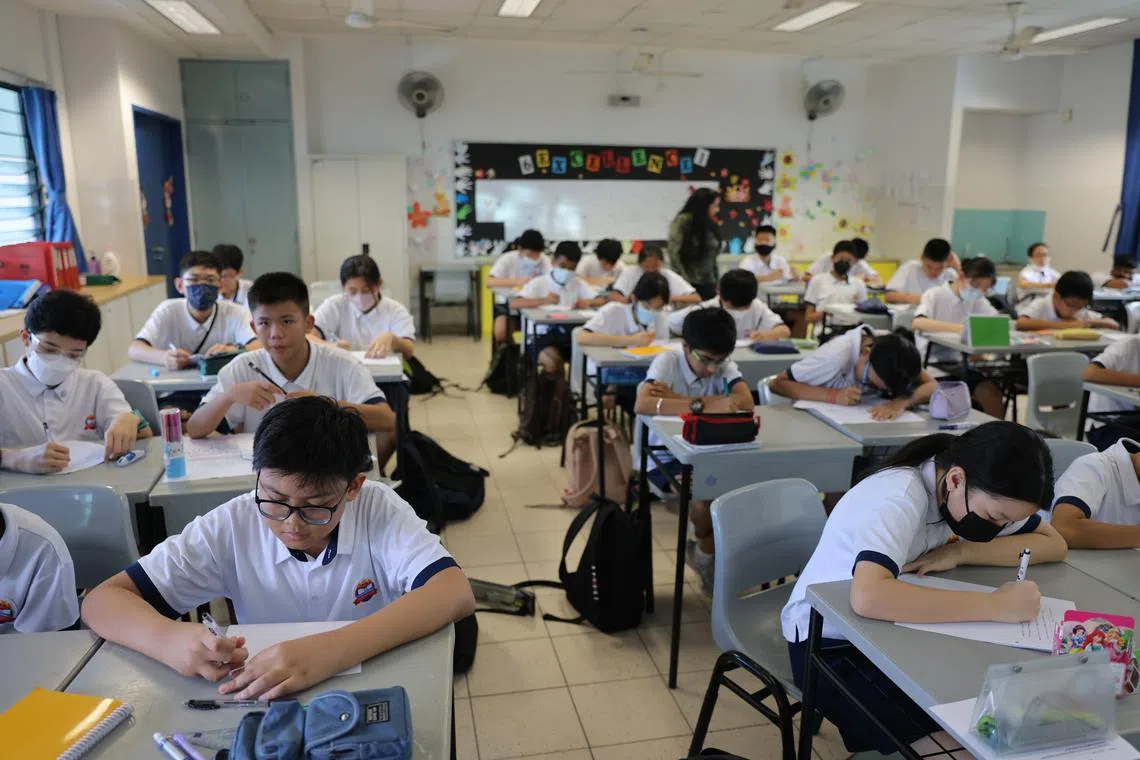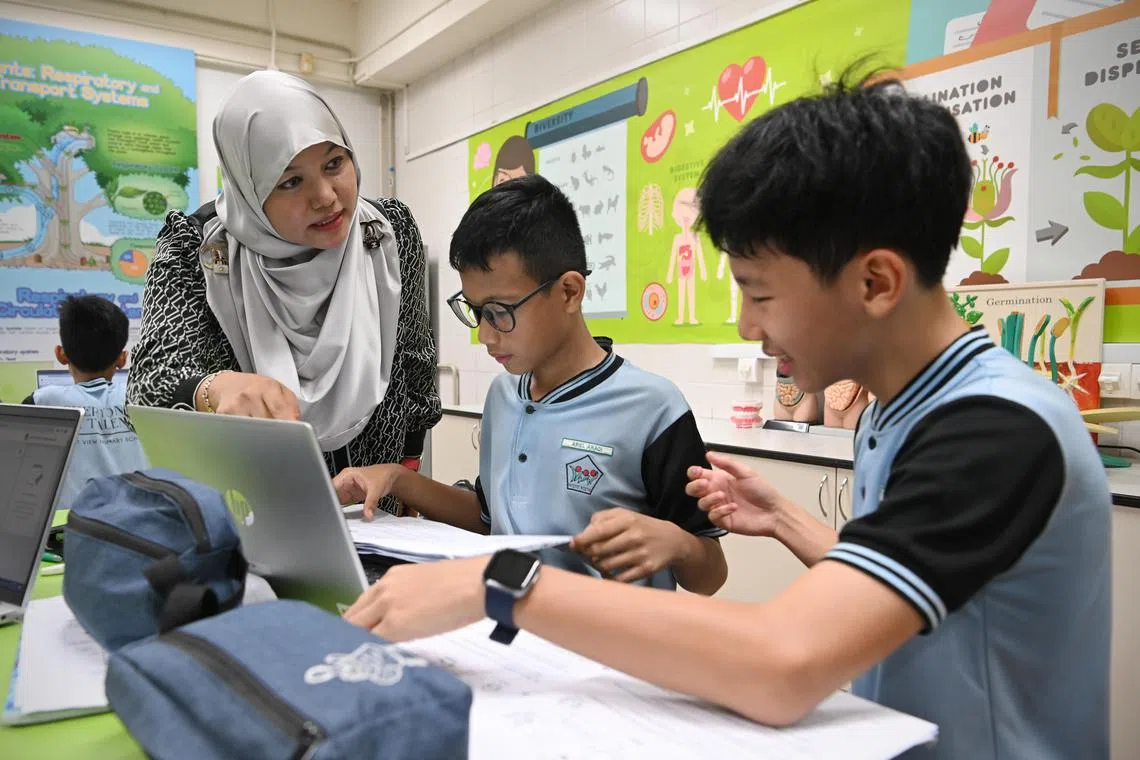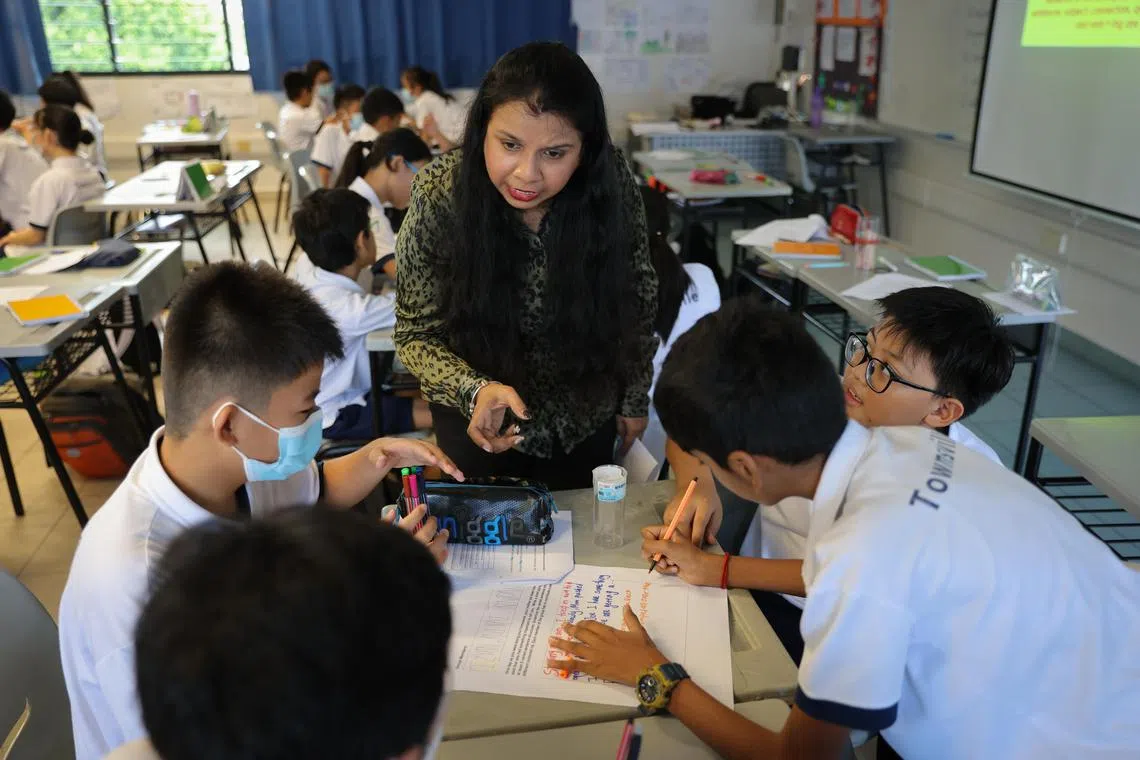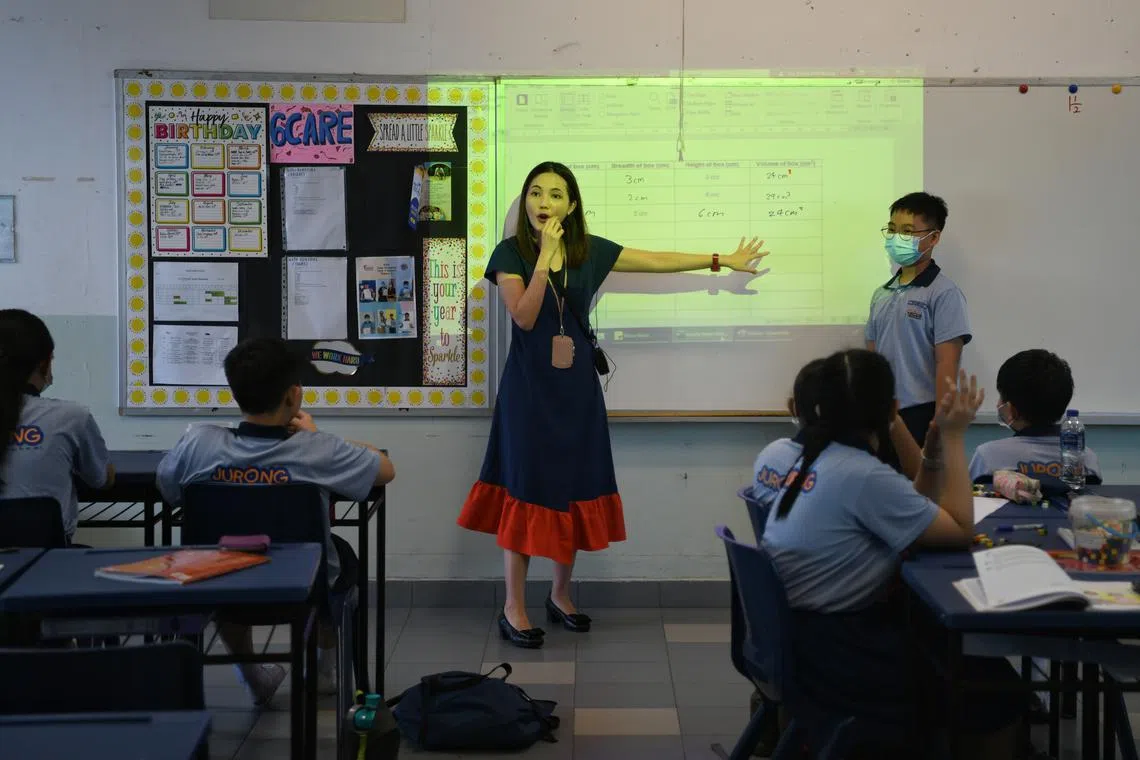PSLE preparation: How to help your child get the most out of revision in June
Sign up now: Get tips on how to help your child succeed

Some children may find it hard to begin revising or may not know the most effective way to learn.
ST PHOTO: ONG WEE JIN
Follow topic:
SINGAPORE – Pupils who are weak in Chinese language tell Ms Teo Xiwen that they feel overwhelmed when preparing for the Primary School Leaving Examination (PSLE) because they struggle with all components of the exam.
Ms Teo, head of mother tongue languages at Ahmad Ibrahim Primary School, advises them to take small steps to improve instead of dwelling on what they do not know.
For example, they could revise and remember a few Chinese words each day to improve their vocabulary, and try to use one good phrase or sentence in their compositions each week.
“No matter how little time they think they have left for preparation, I assure my students that every minute makes a difference,” she says.
She has found that helping her pupils set achievable targets and celebrating every little success can boost their morale.
“When they feel encouraged, they will become energised and motivated to transform thoughts into actions,” she says.
With less than five months to the PSLE, experienced primary-school teachers and tutors share tips on how parents can guide their child to get the most out of their revision in the next few months.
What is next after mid-year assessments?
The test results are in and it is a good time to take stock of what needs to be done for each subject, say teachers.
For example, The Learning Lab’s science subject head for Tampines and Seletar, Ms Choo Xin Ying, says May is a good time to identify areas of weakness and analyse errors.
Mistakes could have been made because of the lack of content knowledge or technique. For example, they did not know how to eliminate ambiguous multiple-choice options or narrow down question requirements accurately, she says.
Mr Jayce Or, founder of Germinate Learning, a science enrichment centre, explains what a range of scores could mean in terms of a child’s understanding of Science.
When they score below 50 marks, pupils are weak in their conceptual understanding, he says.
“Multiple-choice questions (MCQ) will have close but wrong options. When students are weak in concepts, they may end up selecting wrong answers.”
The solution? Revise and understand the concepts of the topics that pupils are weak in; then practise more MCQ until they can consistently get more than 40 marks in Booklet A, which consists of 28 MCQs and a total of 56 marks, he says.
Pupils who score between 51 and 75 may know and understand the science concepts fairly well, but face problems in the open-ended questions of Booklet B.
They have difficulty getting the clues in the questions and may end up choosing incorrect data. They can try highlighting keywords in questions to narrow down the information needed for their answers.
Pupils who score between 76 and 89 may lack the ability to provide specific answers. For instance, different types of question keywords such as “state, describe or explain” require different ways of answering the question, Mr Or adds.
Aside from assessing the work to be done, parents should also check in on their child to make sure they are coping well.
Madam Efizah Samat, head of department for science at West View Primary, reminds parents to provide emotional support for their child.
“They can encourage their child to share their concerns. This way, the child would not feel that ‘There’s no point in telling my parents about schoolwork, because they will not understand anyway,’” she says.

Madam Efizah Samat and her pupils during science lessons at West View Primary School.
ST PHOTO: NG SOR LUAN
Have a plan for revision and rest in June
Some children may find it hard to begin revising or may not know the most effective way to learn, says Ms Nur Sofhia Buang, head of department for mathematics at Jurong Primary.
Parents can help by providing a structure for revision in June:
Guide your children to set goals and decide what they want to revise.
Gather materials and organise them by topic or difficulty level.
Make sure to plan for breaks, exercise and family bonding time.
Casuarina Primary’s head of mother tongue languages, Mr Mohamad Zareen Mohamed Shariff, reminds parents to work with their child to ensure a good balance of activities to learn, rest and play.
One way to get more out of revision time is to tackle two topics or subjects in a day, instead of spending a full day on a single subject or topic.
Dr Lubna Alsagoff, director of curriculum and pedagogy at The Learning Lab, says studies have shown that it is more effective when children vary what they study in a day and keep the sessions short.
“Neuroscience research calls this interleaving or spaced retrieval. It helps your brain function better and aids in revision,” she adds.
Ways to tackle different subjects
The June holidays are a good time to clarify doubts.
Pupils should also make use of the extra time to organise content into topics and use mnemonics to help in the recall of information, says Mrs Therese Cheng, The Learning Lab’s head of centre excellence.
Teachers say one good habit to start is to have a journal for each subject – collating either common mistakes, tricky questions or more challenging topics – for quick reference.
For instance, Ms Choo Swee Heng, The Learning Lab’s mathematics lead subject, says pupils should re-attempt repeated mistakes in their maths journal.
Here are more suggestions from teachers on how a child can tackle revision for each subject. Adjust them according to your child’s needs.
English

Madam Shanthi Deenathayalan from Townsville Primary School conducting an English oral lesson.
ST PHOTO: ONG WEE JIN
Madam Shanthi Deenathayalan, Townsville Primary’s head of department for English, suggests that pupils take time in June to read storybooks, newspapers or articles to improve their vocabulary and comprehension skills.
From these materials, pupils can pick out a theme and write words or phrases associated with it.
To improve in composition writing, they can compile a list of common themes – such as friendship, courage, an apology, perseverance, a difficult decision and an unforgettable experience – then practise writing short essays or come up with ideas for them.
Another way is to collect good compositions with different themes.
Mrs Juliana Cheong, The Learning Lab’s English lead subject head, says pupils can draw up a list of descriptive phrases for compositions and sort them into different categories such as emotions or common scenarios.
For components like grammar or synthesis and transformation, they should look through their past exams and worksheets and extract commonly tested rules.
“Putting together one’s own notes helps students to better internalise the content as this is an active review of what they have learnt,” she says.
Mother tongue
Mr Roi Xu, regional head of learning product at LingoAce, an online Chinese language learning platform, suggests that pupils take the time in June to reinforce their basics.
He advises pupils to go through the textbook glossary, mark out unfamiliar words and spend time improving their vocabulary.
Read the passages from the textbook for context and do this daily for pupils weak in word recognition, he says.
Mr Mohamad Zareen from Casuarina Primary agrees that regular reading is a must to enhance language proficiency, whether in Chinese, Malay or Tamil.
He says that apart from speaking the language at home, parents can create opportunities for the child to practise speaking with relatives or friends who are fluent in the language.
Parents can also watch television programmes with their children to give them more exposure to the language. This will help them understand the language better and encourage them to learn it, he adds.
Mathematics

Ms Nur Sofhia Buang from Jurong Primary School conducting a mathematics lesson.
ST PHOTO: SHINTARO TAY
Instead of getting a child to complete as many past exam papers as possible, parents should first help him or her to focus on understanding key concepts and principles behind the problems, says Ms Sofhia from Jurong Primary.
“With conceptual understanding, learning becomes meaningful and practices help reinforce learning.”
If a child is stuck on a particular concept or question, do not leave it for later or he or she will forget about it, she advises. Instead, immediately refer to the textbook, worksheets or online Student Learning Space (SLS) to fill in any gaps in the child’s understanding.
For complex problems, Ms Sofhia has a four-step process:
1. Understand the problem (underline key information or break down problem into smaller parts)
2. Select a strategy (such as the model method, working backwards, finding patterns)
3. Do the problem
4. Check your answer by using another method
Ms Choo from The Learning Lab suggests zooming in on specific concepts that require more practice, rather than broadly tackling the issue of “problem sums”.
Science
Mr Or of Germinate Learning says a child could start with topical revision for one to three hours a week.
After that, move on to past years’ papers to gain exposure to a wide range of questions.
He adds that some topics are more important than others. “Spend more time revising topics that school teachers take more time to go through and less time on topics that are covered quickly.”
It is also not enough to just memorise scientific keywords. A pupil needs to adjust them to fit the question’s requirements, he says.
Madam Efizah Samat, head of science at West View Primary School, says the primary science syllabus is based on themes.
To get pupils to learn the relationship between themes, one way is to do mindmaps or summaries.
The Learning Lab’s Ms Choo says such active consolidation of concepts will help pupils to become more familiar with the content.
If mindmaps do not work for the topic, pupils can also create flashcards on the topics and get their parents or siblings to help to test them, she says.
Parents can help to relate the learning of science to the real world to help their child see the relevance of what he or she is learning.
For instance, relate the conditions of fungi growing in moist conditions to get a child to think about why fungi can grow on feet and whether wearing slippers instead of covered shoes will help prevent it, says Madam Efizah.
“Science is about developing curiosity and inquiry. When students are inspired by the world around them, they will be motivated to learn science,” she adds.
This is the first of a three-part series on how to guide your child to get the most out of PSLE revision.
Look out for the second and third parts of the series which will be out in July and August. They will focus on oral exam and mental preparation.
For more tips on guiding your child to prepare for the PSLE, sign up for a PSLE preparation forum organised by The Straits Times on May 20. Find out more at
str.sg/psle2023.
Registration closes on Tuesday.


